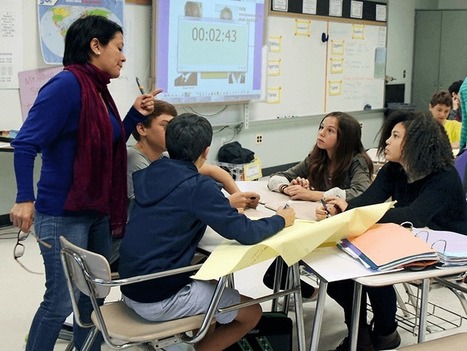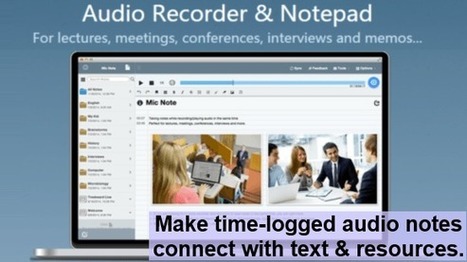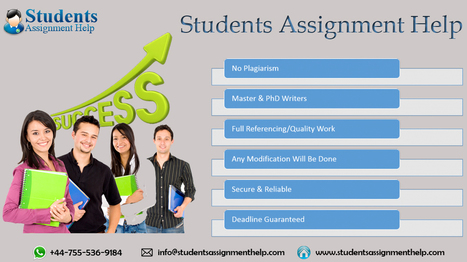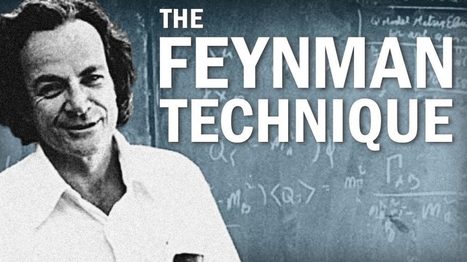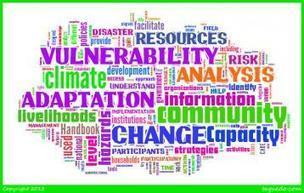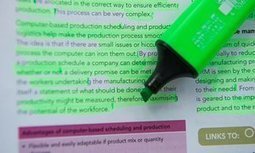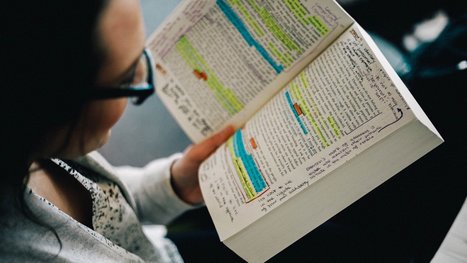 Your new post is loading...
 Your new post is loading...
Plagiarism is concerning for colleges and universities (Curtis & Vardanega, 2016). Students begin higher education with varying degrees of knowledge on the topic of plagiarism; sometimes students have a limited understanding of the behaviors that constitute plagiarism. Gourlay and Deane (2012) suggest “a proportion of plagiarism is committed via confusion over how to integrate and reference source materials into academic writing” (p. 19). Moreover, some students might be unfamiliar regarding when they can claim an opinion as their own and when they need to use a citation (Ballantine & McCourt Larres, 2010). Being unfamiliar with the behaviors that constitute plagiarism might be a reason why students engage in this type of academic misconduct (Insley, 2011).
Via Elizabeth E Charles
15 Reflection Strategies To Help Students Retain What You Just Taught Them by Terry Heick Reflection is a natural part of learning. We all think about new experiences–the camping on the car ride home, the mistakes made in a game, or the emotions felt while finishing a long-term project that’s taken months to complete. Below …
Via Ana Cristina Pratas, Elizabeth E Charles
Before having your paper accepted for publication in a peer reviewed journal you’ll almost certainly be required to revise your manuscript at least once. But for less experienced authors this may not always feel so straightforward. Deborah Lupton has compiled a list of quick tips for authors who have been asked to revise their article. Remember that being exposed to critique is an inevitable part of academic writing, challenge yourself to improve your work, address all reviewer comments, and you’ll be ready to resubmit.
Via Elizabeth E Charles
Do you need help with writing in English right now?
Are you having trouble starting an essay?
Or have you finished that essay, but are wondering if all your English writing is correct?
We’ve got all the help you need to make your English writing perfect.
It’s okay to get some help. Writing can be a challenge in any language. After all, you need to use lots of key language skills and express your creativity.
Many non-native English speakers are nervous about writing in English, because they feel like the language barrier is stopping them from being creative.
Via Elizabeth E Charles
Faculty often tell students to study two hours for every credit hour. Where and when did this rule of thumb originate? I’ve been unable to track down its genesis. I suspect it started around 1909, when the Carnegie Unit (CU) was accepted as the standard measure of class time. [See Heffernan (1973) and Shedd (2003) for thorough histories of the credit hour.] The U.S. Department of Education defines the credit hour as “One hour of classroom or direct faculty instruction and a minimum of two hours of out of class student work each week for approximately fifteen weeks for one semester…” The expectation was the norm when I was in college in the 1980s and more seasoned professors indicate it was expected in the 1970s too.
Via Elizabeth E Charles
Quick, what’s the capital of Australia? No Googling! (And no points if you’re Australian—that means the information is more meaningful to you, which means you’re more likely to know it). Did you get it? Or are you sure you learned it at some point, but forgot right around the time that you forgot how the Krebs cycle works? In his new book, Learn Better, author and education researcher Ulrich Boser digs into the neuroscience of learning and shows why it’s so hard to remember facts like that one. Boser explains why some of the most common ways we try to memorize information are actually totally ineffective, and he reveals what to do instead.
Via Elizabeth E Charles
As many of us might have already realised, there is reading where you just look at the book and there is actually reading. With the former, you might get through the chapter faster, but will end up coming back to the same pages to remind yourself of what exactly you read. Have you found yourself doing that lately? Do not fear, we will share a technique to bring your reading to a higher level and also give general tips on managing your readings well!
Via Elizabeth E Charles
Paraphrasing tools or article ‘spinners’ are free Internet sites which use computer programs to change writing so it looks different to the original text. While it may look different to the source material, using the output from an online tool can be considered a form of plagiarism or cheating as it is not an individual’s work but the work of a machine. This study, published in the International Journal for Educational Integrity, shows that the machine outputs are of poor quality, cannot be trusted and there are ways of detecting their use.
Via Elizabeth E Charles
Description: Make time-logged audio notes and minutes and connect with text and resources. Make audio notes for your class to use for revision. Available as A Windows/Mac/Linux download and Android/Chrome apps.
Via Elizabeth E Charles
No writer ever feels totally confident about their writing. A lack of confidence is normal. In fact, a slight of self-doubt can be a very positive thing. It inspires students to revise and edit their work thoroughly.
Via Elizabeth E Charles
Education and cognitive science are largely separate worlds that have begun communicating only in the last decade, partly because “teachers see all sorts of reforms come and go, and they’re skeptical — and rightly so — of anyone who comes in and says, “Well, I’m going to tell you how to make the kids learn better,” he said.
Via Nik Peachey, Elizabeth E Charles
Share on FacebookTweet ThisGoogle+Pin ItLinkedIn There are, of course, just the two certainties in life – death and taxes and all that – but if there’s a third, then it’s that, at some point, we’ll have to take exams. So what’s the harm in a little nudge in the right direction? A little extra help? …
Via Elizabeth E Charles
|
The unfortunate fact is that few of us ever really come to grips with what it means to study, apart from sitting by oneself with a textbook for hours on end. Despite its obvious inefficiency as a learning method, we’ve all found ourselves doing that kind of “studying” at one time or another. Having taught psychology classes for 40 years, Pierce College professor Marty Lobdell has seen thousands of students laboring, indeed suffering, under similar studying-related assumptions, and in his 8.7-million-times-viewed talk “Study Less, Study Smart,” he sets out to correct them. He has also dispensed his wisdom in a book by the same title.
Via Elizabeth E Charles
Richard Feynman knew his stuff. Had he not, he probably wouldn't have won the Nobel Prize in Physics, let alone his various other prestigious scientific awards. But his reputation for learning all his life long with a special depth and rigor survives him, and in a sense accounts for his fame — of a degree that ensures his stern yet playful face will gaze out from dorm-room posters for generations to come — even more than does his "real" work. Many students of physics still, understandably, want to be like Feynman, but everyone else, even those of us with no interest in physics whatsoever, could also do well to learn from him: not from what he thought about, but from how he thought about it.
Via Elizabeth E Charles
Word clouds or tag clouds are graphical representations of word frequency that give greater prominence to words that appear more frequently in a source text. The larger the word in the visual the more common the word was in the document(s). This type of visualization can assist evaluators with exploratory textual analysis by identifying words that frequently appear in a set of interviews, documents, or other text. It can also be used for communicating the most salient points or themes in the reporting stage.
Via Elizabeth E Charles
Survey helps students identify the study strategies associated with higher exam grades and those that students propose using to improve on the next exam.
Via Elizabeth E Charles
For 10 years, I’ve been teaching study skills to college students, both individually and in the classroom. The vantage from my office offers me a clear view of students devouring information during tutoring appointments and focusing intently on the strategies shared during study skills counseling sessions. The effort and time they pour into comprehending their course material is irrefutable. However, when I ask students what they know about the lecture’s content before arriving at class, the answer is almost always the same: “Nothing.”
Via Elizabeth E Charles
Amongst the nasty habits your lecturers have is setting this particular piece of torture. Group assignments be they assessed collectively or individually are a minefield for the student so I have summarised my survival tips here. I won’t promise these will mean you have a fun time, but following this advice will give you the best chance of doing well and completing the assignment with the least amount of stress.
Via Elizabeth E Charles
The imperative to increase use of technology and improve the digital skills capability of the workforce is a common thread running through recent government and sector reports.
Via Elizabeth E Charles
Ditch the highlighter and teach a friend. Psychology shows us a lot about how to improve our memory and avoid distractions – here are some dos and don’ts
Via Elizabeth E Charles
As avid lovers of literature, teachers often find themselves wanting to impart every bit of knowledge about a well-loved text to their students. And this is not just an ELA issue—other disciplines also often focus on the content of a text. However, teaching reading skills in English classes and across the disciplines is an almost guaranteed way to help students retain content. Unfortunately, the tendency to focus on the content is a real enemy to the ultimate goal of building reading skills.
Via Elizabeth E Charles
|



 Your new post is loading...
Your new post is loading...




